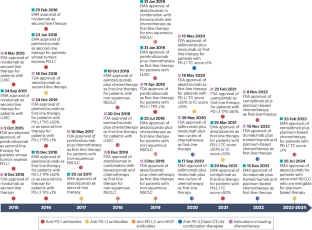Immunotherapy for advanced-stage squamous cell lung cancer: the state of the art and outstanding questions
IF 81.1
1区 医学
Q1 ONCOLOGY
引用次数: 0
Abstract
Immune-checkpoint inhibitors (ICIs) have transformed the treatment paradigm for advanced-stage squamous non-small-cell lung cancer (LUSC), a histological subtype associated with inferior outcomes compared with lung adenocarcinoma. However, only a subset of patients derive durable clinical benefit. In the first-line setting, multiple ICI regimens are available, including anti-PD-(L)1 antibodies as monotherapy, in combination with chemotherapy, or with an anti-CTLA4 antibody with or without chemotherapy. Several important questions persist regarding the optimal regimen for individual patients, particularly how to identify patients who might benefit from adding chemotherapy and/or anti-CTLA4 antibodies to anti-PD-(L)1 antibodies. An urgent need exists for predictive biomarkers beyond PD-L1 to better guide precision oncology approaches. Deeper knowledge of the underlying molecular biology of LUSC and its implications for response to ICIs will be important in this regard. Integration of this knowledge into multi-omics methods coupled with artificial intelligence might enable the development of more robust biomarkers. Finally, several novel therapeutic strategies, including novel ICIs, bispecific antibodies and personalized cancer vaccines, are emerging. Addressing these unresolved questions through innovative clinical trials and translational research will be crucial to further improving the outcomes of patients with LUSC. In this Review, we provide a comprehensive overview of current immunotherapeutic approaches, unresolved challenges and emerging strategies for patients with LUSC. Despite lower levels of most targetable alterations, a strong association with a history of smoking and generally higher levels of PD-L1 expression, patients with squamous non-small-cell lung cancer (LUSC) have inferior outcomes on immune-checkpoint inhibitors (ICIs) compared to those with non-squamous disease. In this Review, the authors describe the available evidence on the role of ICIs and of potential novel therapies in patients with LUSC, as well as highlighting important unresolved challenges and future research directions in this historically overlooked subtype.


晚期鳞状细胞肺癌的免疫治疗:现状和悬而未决的问题
免疫检查点抑制剂(ICIs)已经改变了晚期鳞状非小细胞肺癌(LUSC)的治疗模式,这是一种与肺腺癌相比预后较差的组织学亚型。然而,只有一小部分患者获得了持久的临床益处。在一线环境中,多种ICI方案是可用的,包括抗pd -(L)1抗体作为单一治疗,与化疗联合,或与抗ctla4抗体联合化疗或不化疗。关于个体患者的最佳方案,几个重要的问题仍然存在,特别是如何识别可能从添加化疗和/或抗ctla4抗体到抗pd -(L)1抗体中获益的患者。目前迫切需要PD-L1以外的预测性生物标志物来更好地指导精确的肿瘤学方法。在这方面,更深入地了解LUSC的潜在分子生物学及其对ICIs反应的影响将是重要的。将这些知识整合到多组学方法中,再加上人工智能,可能会开发出更强大的生物标志物。最后,一些新的治疗策略正在出现,包括新型免疫球蛋白、双特异性抗体和个性化癌症疫苗。通过创新的临床试验和转化研究来解决这些尚未解决的问题对于进一步改善LUSC患者的预后至关重要。在这篇综述中,我们提供了对LUSC患者当前免疫治疗方法、未解决的挑战和新兴策略的全面概述。
本文章由计算机程序翻译,如有差异,请以英文原文为准。
求助全文
约1分钟内获得全文
求助全文
来源期刊
CiteScore
99.40
自引率
0.40%
发文量
114
审稿时长
6-12 weeks
期刊介绍:
Nature Reviews publishes clinical content authored by internationally renowned clinical academics and researchers, catering to readers in the medical sciences at postgraduate levels and beyond. Although targeted at practicing doctors, researchers, and academics within specific specialties, the aim is to ensure accessibility for readers across various medical disciplines. The journal features in-depth Reviews offering authoritative and current information, contextualizing topics within the history and development of a field. Perspectives, News & Views articles, and the Research Highlights section provide topical discussions, opinions, and filtered primary research from diverse medical journals.

 求助内容:
求助内容: 应助结果提醒方式:
应助结果提醒方式:


